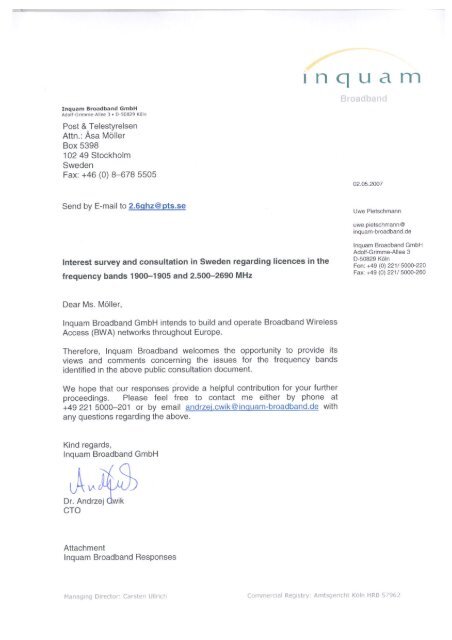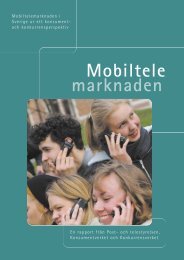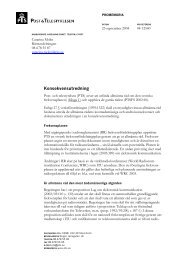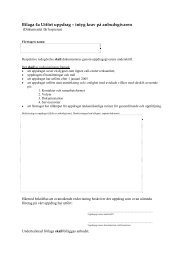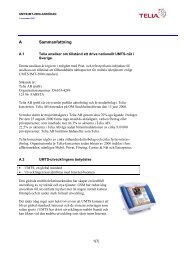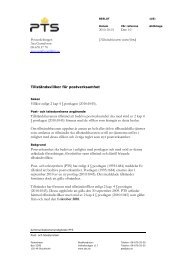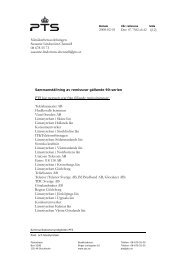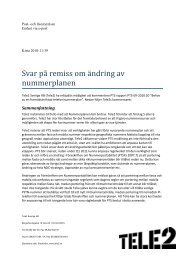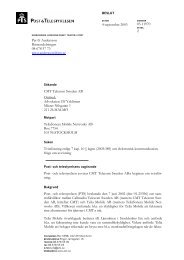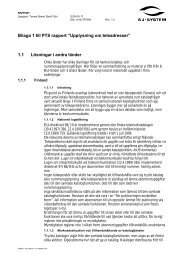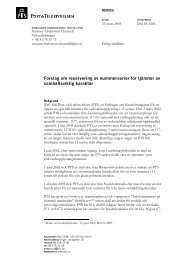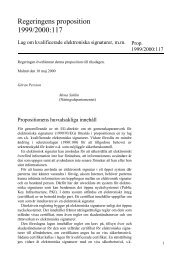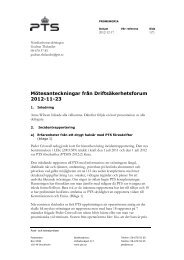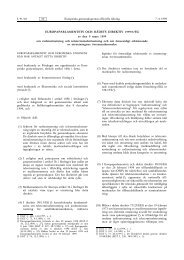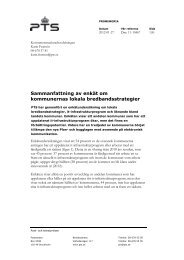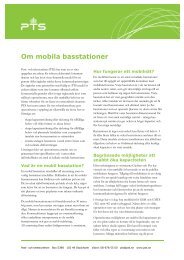Carsten Ullrich Commercial Registry: Amtsgericht Köln HRB 57962
Carsten Ullrich Commercial Registry: Amtsgericht Köln HRB 57962
Carsten Ullrich Commercial Registry: Amtsgericht Köln HRB 57962
Create successful ePaper yourself
Turn your PDF publications into a flip-book with our unique Google optimized e-Paper software.
Managing Director: <strong>Carsten</strong> <strong>Ullrich</strong> <strong>Commercial</strong> <strong>Registry</strong>: <strong>Amtsgericht</strong> <strong>Köln</strong> <strong>HRB</strong> <strong>57962</strong>
Inquam Broadband Responses<br />
Question 1: What is your opinion on PTS's proposal to award the<br />
frequency bands 1900 – 1905 and 2500 – 2690 MHz during the first<br />
six months of 2008?<br />
The Inquam Broadband Response: Inquam Broadband fully<br />
supports the award of the 1900 – 1905 MHz and 2500 – 2690 MHz<br />
spectrum at the earliest opportunity.<br />
Question 2: What is your opinion on PTS's proposal to award<br />
national licences in the frequency bands 1900 – 1905 and 2500 –<br />
2690 MHz?<br />
The Inquam Broadband Response: Inquam Broadband supports<br />
PTS’s proposal to award national licences in both frequency bands.<br />
Question 3: What is your opinion on PTS's proposal to award:<br />
a) Technology and service neutral licences in the 2500 – 2690 MHz<br />
band, and<br />
b) 1900 – 1905 MHz for UMTS–TDD?<br />
The Inquam Broadband Response:<br />
Part a): Inquam Broadband fully agrees that licence awards should<br />
remain both technology neutral and service neutral in the 2500 –<br />
2690 MHz band.<br />
The 2.6 GHz band is widely available for Broadband Wireless Access<br />
(BWA). Within Europe, the UK, Norway, Italy and Belgium have either<br />
recently consulted or are currently consulting on a technology and<br />
service neutral approach.<br />
Opening the band for use by state-of-the-art technologies will<br />
enhance the opportunity to support technical innovation, to stimulate<br />
competition and to allow market demand for broadband services to<br />
be satisfied for the benefit of Swedish customers.<br />
Part b): Inquam Broadband supports service and technology neutral<br />
attribution in all bands. Market requirements should decide about the<br />
best fit of technology to the customer demand.<br />
Page 2 of 6
Question 4: What is your opinion on PTS's proposal to award:<br />
a) 2570 – 2620 MHz for TDD, and<br />
b) 2500 – 2570 and 2620 – 2690 MHz for FDD uplink and downlink?<br />
Inquam Broadband Response:<br />
Part a) Inquam Broadband believes that there will be strong demand<br />
for TDD operation in this band if this spectrum is assigned in a<br />
technology neutral manner.<br />
The TDD mode is more suitable to account for asymmetric traffic<br />
applications i.e. imbalanced requirements for up- and downlink. The<br />
latter applies to many applications and since the uplink and downlink<br />
ratio can be changed easily, TDD systems are able to achieve higher<br />
spectrum efficiency.<br />
Given this anticipated demand for TDD applications, Inquam<br />
Broadband believes that the proposed FDD allocation is too large<br />
relative to the TDD allocation. Inquam Broadband would prefer to let<br />
market forces decide whether the attribution shall be a paired or<br />
unpaired spectrum. In this context see also Inquam Broadband’s<br />
response to Question 4 b) below.<br />
Part b) As already mentioned above in response to Question 4 a),<br />
Inquam Broadband would prefer to let the market decide whether the<br />
attribution shall be paired or unpaired. One possible solution is not to<br />
decide a split beforehand, but to design the awarding procedure in a<br />
way which allows the bidders to bid for either unpaired or paired<br />
spectrum (as suggested by the UK for instance, see [1]).<br />
In this context it is also very important to have full tradability of the<br />
awarded spectrum. Furthermore, the operators should have a right to<br />
change the usage conditions (i.e. usage of TDD technology in paired<br />
bands) or a right of mutual coordination with other spectrum owners<br />
(e.g. for spectrum swaps).<br />
Question 5: What is your opinion on PTS's proposal to award:<br />
a) One licence (5 MHz) in the 1900 – 1905 MHz band (UMTS–TDD)<br />
b) One licence (50 MHz) in the 2570 – 2620 MHz band (TDD)<br />
c) 14 paired frequency blocks each of 2×5 MHz in the 2500 – 2570<br />
MHz and 2620 – 2690 MHz bands (FDD)?<br />
Inquam Broadband Response: Inquam Broadband suggests<br />
partitioning of the entire 2500 – 2690 MHz band into 5 MHz blocks<br />
either paired or unpaired. Awarding a single unpaired licence within<br />
2570 – 2620 MHz band does not support competition to the benefit of<br />
the Swedish customers. In any case, the number of licences<br />
Page 3 of 6
awarded per operator should be limited in a manner that takes into<br />
account operators’ pre-existing spectrum assignments in the<br />
900/1800 MHz and 2 GHz bands. Furthermore, some spectrum<br />
should be reserved for new market entrants in order to support<br />
competition to the benefit of the Swedish customers. See also<br />
Inquam’s response to Question 8.<br />
Question 6: What is your opinion on PTS's proposal for bids in the<br />
auction for 2500 – 2570 and 2620 – 2690 MHz to refer to a specific<br />
2×5 MHz block?<br />
Inquam Broadband Response: For better transparency the bids<br />
should refer to specific 5 MHz and 2x5 MHz blocks. After assignment,<br />
the licensees should be allowed to swap frequency blocks based on<br />
mutual agreement.<br />
Question 7: What is your opinion on PTS's proposal to not have rollout<br />
or coverage obligations in the licences?<br />
Inquam Broadband Response: Inquam Broadband is in favour of<br />
PTS’s proposal since the Swedish customers already have a broad<br />
choice among various networks and services. Inquam Broadband<br />
does not believe that coverage obligations are the right measures to<br />
ensure efficient use of the spectrum. Inquam Broadband<br />
understands that the licensees will be operating in a competitive<br />
environment and will have the incentive to maximize the value of their<br />
spectrum by ensuring that they are in a better competitive position<br />
with regard to service coverage.<br />
Question 8: What is your opinion on PTS's proposal for a 110 MHz<br />
spectrum cap for those applying for both FDD and TDD frequencies<br />
in the frequency band 2500 – 2690 MHz?<br />
Inquam Broadband Response: Inquam Broadband agrees with the<br />
concept of a spectrum cap, but suggests an alternate approach.<br />
First, the size of the cap should be smaller in order to allow access to<br />
the spectrum by more operators for the benefit of Swedish<br />
customers. Additionally the spectrum cap should take into account<br />
the existing assignments in 900/1800 MHz and 2 GHz bands. In<br />
accordance to the WAPECS concept, these spectrum ranges can be<br />
treated as equivalents to the 2500 – 2690 MHz band in terms of<br />
services. Therefore, in order to provide a level playing field and<br />
increase competition among service providers, a more stringent<br />
spectrum cap should be applied to the newly available spectrum.<br />
Page 4 of 6
Second, existing mobile operators are using the same technology<br />
platforms and therefore benefit from economies of scale for their<br />
deployments. Additionally, they have comparable cost structures<br />
based on their common technology platforms and thus no pressure to<br />
innovate. They have also existing customer bases which give them a<br />
powerful market position. The combination of these factors, leads to<br />
a significant market distortion.<br />
Excluding existing mobile operators would be an appropriate<br />
approach to enable spectrum access by new entrants and would<br />
support increased competition as well as the introduction of new<br />
innovative products. An increase in innovation and competition will in<br />
turn lead to improved service offerings and a decrease in prices.<br />
Furthermore, due to an increasing competitive situation, existing<br />
mobile operators will be driven to use their spectrum holdings more<br />
efficiently.<br />
At a later stage when other spectrum resources could be made<br />
available, all successful operators should be permitted to apply for<br />
additional spectrum, but only after consideration of an appropriate<br />
cap on the total amount of their spectrum holdings. Such an<br />
approach will lead to balanced market conditions for both established<br />
operators as well as for new entrants.<br />
Question 9: What is your opinion on PTS's proposed spectrum<br />
masks for FDD base stations (Figures 1–3)?<br />
Inquam Broadband Response: Inquam Broadband has no<br />
comments on this spectrum mask.<br />
Question 10: What is your opinion on PTS's proposed spectrum<br />
masks for TDD base stations (Figures 4–5)?<br />
Inquam Broadband Response: Inquam Broadband does not<br />
support the proposed TDD BS EIRP spectrum mask definition for the<br />
lower band edge, since it would further narrow the usable spectrum<br />
for TDD deployments to fulfil those limits, i.e. the out-of-band limit.<br />
An additional decrease in the amount of TDD-usable spectrum is not<br />
reasonable given that TDD mode is more suitable to account for<br />
asymmetric traffic scenarios which apply more and more to many<br />
applications. From there, a strong demand for TDD operation can be<br />
expected. Furthermore, given that the uplink and downlink ratio can<br />
Page 5 of 6
e changed easily, TDD systems are able to achieve higher spectrum<br />
efficiency (see also Inquam Broadband’s response to Question 4).<br />
To sum up, coexistence between FDD and TDD should be established<br />
based on similarly spectrum mask requirements for both on<br />
the expense of the FDD and TDD deployments. This would be also in<br />
line with the proposed approach to award the 2500–2690 MHz<br />
spectrum on a technology and service neutral base (see also Inquam<br />
Broadband’s response to Question 3).<br />
Question 11: What is your opinion on PTS's proposed spectrum<br />
masks for FDD and TDD terminals (Figures 6–7)?<br />
Inquam Broadband Response: Instead of defining the terminals’<br />
spectrum mask based on the maximum transmitter spectral power<br />
density, Inquam Broadband suggests to define the transmitter mask<br />
based on transmitted EIRP density. The maximum transmitted EIRP<br />
spectral power density should set at least set to 24dBm/MHz without<br />
any assumptions as to the FDD / TDD terminals antenna gain.<br />
Inquam Broadband agrees with the overall shape of the terminal<br />
spectrum mask.<br />
Question 12: What is your opinion on PTS's proposed technical<br />
conditions for the frequency band 1900 – 1905 MHz?<br />
Inquam Broadband Response: Inquam Broadband has no<br />
comments on these technical conditions.<br />
References<br />
[1] Award of available Spectrum: 2500 – 2690 MHz, 2010 –2025 MHz<br />
and 2290 – 2300 MHz, OFCOM Consultation, December 2006.<br />
Page 6 of 6


